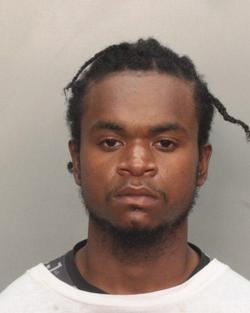Crime is Slate’s crime blog. Like us on Facebook, and follow us on Twitter @slatecrime.
In February, a Florida man named Emanuel McGhee was shot dead outside a grocery store in a drug-related dispute. Drug murders can be hard to solve, as witnesses are not often enthusiastic about talking to the cops. But in McGhee’s case, the Miami police got an unexpected break: an eyewitness told them that 20-year-old Walter Collier was the shooter. On the basis of this testimony and little else, Collier was arrested, booked, and charged with second-degree murder.
Unfortunately, as David Ovalle of the Miami Herald reports, Collier was innocent. Late last month, a man named Marquise Bess confessed to killing McGhee as payback for wounds suffered in a previous altercation. The charges against Collier were dropped, and he was released from jail. But a lot of questions remain.
Most of those questions have to do with, as Ovalle puts it, “the perils of one witness cases.” There’s nothing wrong with using eyewitness testimony. The trouble comes when, as seems to have happened in the Collier case, that testimony is uncorroborated. Eyewitness accounts are often unreliable, mostly because humans have terrible memories. People unwittingly distort details, invent things that didn’t happen, and forget things that did, all while insisting that they’re remembering things accurately. And this doesn’t even begin to account for the people who, for whatever reason, deliberately lie.
Walter Collier and Marquise Bess do look a little bit alike, so perhaps the misidentification was an honest mistake. Or perhaps the guy who fingered Collier was just upset that, as Ovalle reports, Collier had recently accused him of stealing his car. It’s not clear what happened, which is why I agree with Collier’s lawyer: “Police really need to investigate the motives of witnesses, especially in a one-witness case, before any kind of an arrest is made based on that person’s word.”
The police shouldn’t reflexively distrust every witness who offers to testify. But it’s better to be skeptical than too trusting when a potential life sentence hangs in the balance. You can’t just assume that the truth will be sussed out in court. A good lawyer, of course, can poke holes in flimsy testimony. But the young black men who are disproportionately charged with homicide in this country can’t always afford good lawyers. Poor defendants often work with overburdened public defenders who can’t put as much time into their cases as they might like.
Walter Collier did hire his own attorney. But he was also a young black man with a criminal record, charged with committing a crime in “Miami’s most blighted neighborhood”—in other words, he was the sort of unsympathetic defendant who tends not to triumph in court. The fact that he was freed is lucky for him, but it is also a fluke; others in similar situations have not fared as well.
Take Bennett Barbour, falsely convicted of rape in 1978, even though, as Slate’s Dahlia Lithwick reported, the police had “no physical evidence connecting him to the crime, beyond the eyewitness identification by his alleged victim”; DNA evidence exonerated Barbour last year. Or Anthony Graves, who in 1992 was charged with murdering six people in Somerville, Texas, based on the word of one witness; even though that witness recanted three days later, Graves was still convicted. He spent 18 years in prison—12 of those on death row—before he was released in 2010. Or Ronald Cotton, sentenced to life in prison for rape based on the eyewitness testimony of the rape victim; years later, DNA evidence proved that Cotton was not, in fact, the culprit. Or the three Rockford, Ill., men convicted in 2002 of shooting and killing an eight-year-old boy, based primarily on the word of the boy’s uncle; in February, a judge overturned their convictions after he found that audio recordings cast doubt on the veracity of the uncle’s testimony. We know about these men because they have been lucky enough to be exonerated, or to have their convictions overturned. There are certainly others who will never be so lucky, whose stories will never be told.
Cops make arrests. Prosecutors bring cases. That’s what they’re expected to do, and they get in trouble if they don’t. But our justice system is based on the idea that, if there is doubt about a defendant’s guilt, it is better to let him go free than to take the chance of imprisoning him unjustly. In this case, Walter Collier didn’t get the benefit of the doubt. If not for a lucky break, he’d still be behind bars, accused of a crime he didn’t commit.
